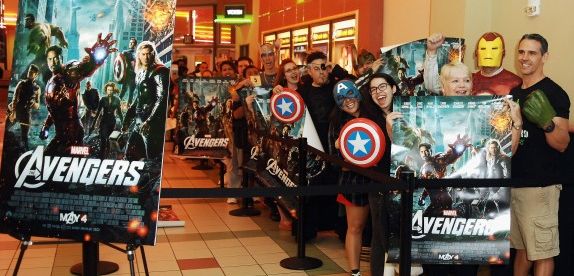If you are a movie fan who cringes at the thought of driving around for half an hour for a parking spot, paying your hard-earned money for a ticket, then being bombarded by a bunch of inconsiderate jerks who remain tethered to their cell phones throughout the movie, you are not alone. But one writer is suggesting that there is a surefire solution to avoiding all these pitfalls of visiting a public movie theater: go at midnight, when the geeks come out to play. Why? Because they’re actually there to see the actual movie, not socialize. Which leads me to wonder why all these other people pay upwards of $12 just to text in the dark.
In Sunday’s edition of The New York Times Magazine, Alexander Huls takes the classic institution of the movie theater and compares it to something a lot more exciting: a jamboree. But not for your rank-and-file moviegoers. For people like us, who wait on lines for hours to be among the first to see a movie at the stroke of midnight, sacrificing our productivity and alertness the entire next day after spending the wee hours of the morning recovering from the previous night’s cinematic experience, this is the experience to which we are more accustomed:
The auditorium is stuffed with noisy, agitated true believers, ready to explode in thunderous cheers; they elatedly chatter at the slightest eyebrow twitch of a beloved character on-screen. This audience is loud, interactive, pumped up and ready to geek out. To the dedicated cinephile, the midnight show might sound like a nightmare.
It’s not. I have learned to adore the midnight show as a moviegoing experience. It has become the one lure that draws me unhesitatingly back to the theater. It’s not just a raucous party to be endured. It’s the one way in which movie theaters can still reliably fulfill their most sacred function.
Well, if The Avengers and The Hunger Games weren’t downright spiritual for you, as Huls makes them sound, then you did it wrong. And you have to try it again.
I’m kidding, of course. You are in no way required to see a genre movie at midnight in order to feel the impact you were supposed to feel from it. But it does kind of help when you consider that you’re not surrounded by people who just went to the movies to get out of the house on a rainy afternoon. You’re surrounded by the most passionate, excited people who give off a hurricane of positive vibes, anticipating the audio-visual retelling of their favorite stories, crafted by talented artists who gave painstaking care to the construction of the script, every edited scene, and every actor’s performance. Or, at least, that’s what we hope for. But you cannot take that anticipation away from us!
And yes, there is usually noise at these screenings, but Huls points out something important about that noise:
The thing to understand about the ruckus of a midnight screening is that, unlike the usual noise you have to filter out at a movie theater, it never feels disruptive, because it’s never disrespectful. The noise isn’t about people distracting others (and themselves) from the movie. It’s directed at the movie. It comes from an irrepressible desire to celebrate what’s being seen. It comes, at its heart, from the greatest emotion a movie can give you: Joy.
Going to the movies should be one of the best things you do for yourself. You can watch a Netflix thing at home if all you want is something to do. But if you want to go on a ride, work a nap into your schedule and go to a midnight screening. We’ll save you a seat, which is guaranteed, because we’ll be there at 10:30 at the latest!
(The New York Times via io9)








Published: May 23, 2012 04:27 pm